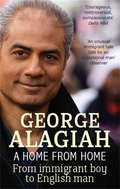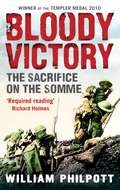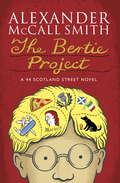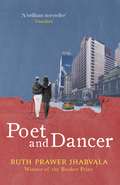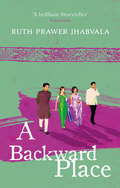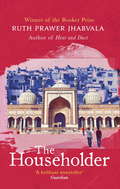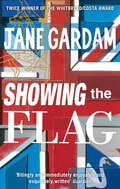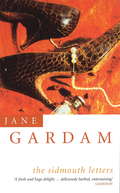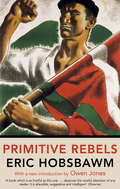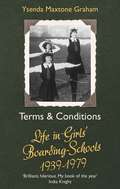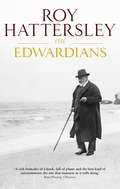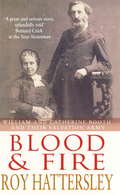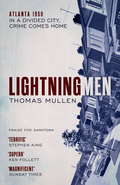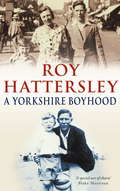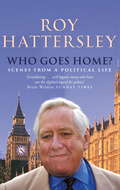- Table View
- List View
A Home From Home: From Immigrant Boy to English Man
by George AlagiahWhen George Alagiah was dropped off at a Hampshire boarding school as a child back in 1967 he was confronted with an extreme version of the private struggle faced by all immigrants - the battle to leave the past behind and fit into a new culture.His arrival in Britain coincided with the unhappy intrusion of race into politics. A key part of the ensuing fight against racism was the concept of multiculturalism. But in a closely argued and forthright chapter, Alagiah suggests that, far from improving the prospects for some immigrants, multiculturalism may be an impediment to integration. All too often these are the poor and isolated communities who most need the help of the state to break out of what is fast becoming a version of ghetto life.Above all, this book is a tender and evocative portrayal of the immigrant experience. Alagiah brings colour and life to a subject that is too often reduced to screaming tabloid headlines, and sheds light on the controversial question of British identity.
Bloody Victory: The Sacrifice on the Somme and the Making of the Twentieth Century
by William Philpott1 July 1916: the first day of the Battle of the Somme. The hot, hellish day in the fields of northern France that has dominated our perception of the First World War for just shy of a century. The shameful waste; the pointlessness of young lives lost for the sake of a few yards; the barbaric attitudes of the British leaders; the horror and ignominy of failure. All have occupied our thoughts for generations. Yet are we right to view the Somme in this way?Drawing on a vast number of sources such as letters, diaries and numerous archives, Bloody Victory describes in vivid detail the physical conditions, the combat and exceptional bravery against the odds but it also, uniquely, captures how the Somme defined the twentieth century in so many ways. This is an utterly gripping new analysis of one of the most iconic campaigns in history.
Bloody Victory: The Sacrifice on the Somme and the Making of the Twentieth Century
by William Philpott1 July 1916: the first day of the Battle of the Somme. The hot, hellish day in the fields of northern France that has dominated our perception of the First World War for just shy of a century. The shameful waste; the pointlessness of young lives lost for the sake of a few yards; the barbaric attitudes of the British leaders; the horror and ignominy of failure. All have occupied our thoughts for generations. Yet are we right to view the Somme in this way?Drawing on a vast number of sources such as letters, diaries and numerous archives, Bloody Victory describes in vivid detail the physical conditions, the combat and exceptional bravery against the odds but it also, uniquely, captures how the Somme defined the twentieth century in so many ways. This is an utterly gripping new analysis of one of the most iconic campaigns in history.
The Bertie Project (44 Scotland Street #11)
by Alexander McCall SmithBertie's respite from his overbearing mother, Irene, is over. She has returned from the middle-east, only to discover that her son has been exposed to the worst evils of cartoons, movies and Irn Bru, and her wrath falls upon her unfortunate husband, Stuart. Meanwhile, Bruce has fallen in love with someone other than himself; Big Lou wants to adopt her beloved Finlay; Matthew and Elspeth host the Duke of Johannesburg for supper and Bertie decides he wants to move out of Scotland Street altogether and live with his grandmother, Nicola.Can Irene and Stuart's marriage survive? Will Bruce's newfound love last? And will Bertie really leave Scotland Street? Find out in the next instalment of this charming, beloved series.
Poet and Dancer
by Ruth Prawer JhabvalaAngel is dark and plain, introverted and submissive, a spontaneous composer of childish verses, wholly consumed by the wild, seductive spell of her cousin Lara - a beautiful, irresponsible creature who expresses herself in free-form dance.What begins as a tender and intimate attachment between two young girls deepens in adulthood into something complex and perilous, as Lara's life spins in increasingly erratic circles while Angel's passionate devotion to her remains undiminished. It is a feverish and impenetrable relationship, of reckless master and willing slave, one forged to shield both Angel and Lara from the harshness of their surroundings, as well as from the far greater terrors of the self. It is a relationship that will end in terror for the young women, and for their families.Set against the vivid, dream-like landscape of of Manhattan in the recent past, Poet and Dancer is an altogether unforgettable novel, written with the subtlety, wry humour and beauty that are the hallmarks of one of the twentieth century's most brilliant novelists and storytellers.
Poet and Dancer
by Ruth Prawer JhabvalaAngel is dark and plain, introverted and submissive, a spontaneous composer of childish verses, wholly consumed by the wild, seductive spell of her cousin Lara - a beautiful, irresponsible creature who expresses herself in free-form dance.What begins as a tender and intimate attachment between two young girls deepens in adulthood into something complex and perilous, as Lara's life spins in increasingly erratic circles while Angel's passionate devotion to her remains undiminished. It is a feverish and impenetrable relationship, of reckless master and willing slave, one forged to shield both Angel and Lara from the harshness of their surroundings, as well as from the far greater terrors of the self. It is a relationship that will end in terror for the young women, and for their families.Set against the vivid, dream-like landscape of of Manhattan in the recent past, Poet and Dancer is an altogether unforgettable novel, written with the subtlety, wry humour and beauty that are the hallmarks of one of the twentieth century's most brilliant novelists and storytellers.
A Backward Place
by Ruth Prawer JhabvalaSix colourful, comic characters inhabit A Backward Place. All but one are Westerners who have come to Delhi to experience an alternative way of life. But, far from being hippies, their ability to adapt to this exotic culture often leaves something to be desired. Etta, an aristocratic, faded beauty maintains her Parisian chic while Clarissa talks enthusiastically about the simple life but stops short of ever roughing it herself. On the other hand Bal, the one Indian protagonist, holds quite Western aspirations to Hollywood glamour.A Backward Place humorously explores contradictions in attitudes and lifestyles and the interplay between culture and individuality. But it is also a Dickensian drama, charting the highs and lows of everyday life against the enchanting backdrop of a bustling Indian city.
A Backward Place
by Ruth Prawer JhabvalaSix colourful, comic characters inhabit A Backward Place. All but one are Westerners who have come to Delhi to experience an alternative way of life. But, far from being hippies, their ability to adapt to this exotic culture often leaves something to be desired. Etta, an aristocratic, faded beauty maintains her Parisian chic while Clarissa talks enthusiastically about the simple life but stops short of ever roughing it herself. On the other hand Bal, the one Indian protagonist, holds quite Western aspirations to Hollywood glamour.A Backward Place humorously explores contradictions in attitudes and lifestyles and the interplay between culture and individuality. But it is also a Dickensian drama, charting the highs and lows of everyday life against the enchanting backdrop of a bustling Indian city.
The Householder
by Ruth Prawer JhabvalaPrem is a recently married teacher who is neither very good at teaching nor at being married. He is promised an ally against his wife Indu, whom he regards with varying degrees of irritation, when his mother comes to visit. He soon finds, though, that maternal interference is far from helpful, and he receives comfort from an entirely unexpected quarter - his wife - as he discovers through her the joys of being a 'settled husband and householder'.From every page rise the heat, the smells, the flashing iridescent colours and the ceaseless rhythms of Indian life. And such is the strength of Ruth Prawer Jhabvala's humorous and perceptive pen that this appealing tale of a young man trying to come to terms with marriage and maturity becomes more than a highly comic vignette of a particular society - it is also a reflection of a universal experience.
Showing The Flag
by Jane GardamThe flag that is shown, literally and metaphorically, by these characters is always the Union Jack. Gardam's stories are acutely observed social commentaries on Englishness, its weaknesses and its illusions.
Showing The Flag
by Jane GardamThe flag that is shown, literally and metaphorically, by these characters is always the Union Jack. Gardam's stories are acutely observed social commentaries on Englishness, its weaknesses and its illusions.
The Sidmouth Letters
by Jane GardamJane Austen's love life - long the subject of speculation - is finally, delightfully dealt with in the title story of this collection. Many of the other stories, like 'The Sidmouth Letters,' bring together past and present - with sometimes hilarious, sometimes disturbing, often intensely moving results.With quiet elegance and devastating accuracy, Jane Gardam probes many and varied lives. We meet a trio of Kensington widows, mean-spirited and middle-aged, paying improbable tribute to a long exploited nanny; we await- with dread- a stranger to tea in an Engliish home; we witness the mercurial changes that take place in young love, and we watch as a bohemian, passionate past returns to tempt domestic bliss.
The Sidmouth Letters
by Jane GardamJane Austen's love life - long the subject of speculation - is finally, delightfully dealt with in the title story of this collection. Many of the other stories, like 'The Sidmouth Letters,' bring together past and present - with sometimes hilarious, sometimes disturbing, often intensely moving results.With quiet elegance and devastating accuracy, Jane Gardam probes many and varied lives. We meet a trio of Kensington widows, mean-spirited and middle-aged, paying improbable tribute to a long exploited nanny; we await- with dread- a stranger to tea in an Engliish home; we witness the mercurial changes that take place in young love, and we watch as a bohemian, passionate past returns to tempt domestic bliss.
Primitive Rebels
by Eric HobsbawmSocial agitation is as essential a part of public life today as it has ever been. In Eric Hobsbawm's masterful study, Primitive Rebels, he shines a light on the origins of contemporary rebellion: Robin Hood, secret societies, revolutionary peasants, Mafiosi, Spanish Civil War anarchy, pre-industrial mobs and riots - all of which have fed in to our notions of dissent in the modern world.Coining now familiar terms such as 'social banditry', Primitive Rebels shows how Hobsbawm was decades ahead of his time, and his insightful analysis of the history of social movements is critical to our understanding of movements such as UK Uncut, Black Lives Matter and the growing international resistance to Donald Trump's presidency.Reissued with a new introduction by Owen Jones, Primitive Rebels is the perfect guide to the revolutions that shaped western civilisation, and the bandits, reformers and anarchists who have fought to change the world.
Primitive Rebels
by Eric HobsbawmSocial agitation is as essential a part of public life today as it has ever been. In Eric Hobsbawm's masterful study, Primitive Rebels, he shines a light on the origins of contemporary rebellion: Robin Hood, secret societies, revolutionary peasants, Mafiosi, Spanish Civil War anarchy, pre-industrial mobs and riots - all of which have fed in to our notions of dissent in the modern world.Coining now familiar terms such as 'social banditry', Primitive Rebels shows how Hobsbawm was decades ahead of his time, and his insightful analysis of the history of social movements is critical to our understanding of movements such as UK Uncut, Black Lives Matter and the growing international resistance to Donald Trump's presidency.Reissued with a new introduction by Owen Jones, Primitive Rebels is the perfect guide to the revolutions that shaped western civilisation, and the bandits, reformers and anarchists who have fought to change the world.
Terms & Conditions: Life in Girls' Boarding Schools, 1939-1979
by Ysenda Maxtone Graham'The girls' boarding school! What a ripe theme for the most observant verbal artist in our midst today - the absurdly undersung Ysenda Maxtone Graham, who has the beadiness and nosiness of the best investigative reporter, the wit of Jane Austen and a take on life which is like no one else's. This book has been my constant companion ever since it appeared' A. N. Wilson, Evening StandardWhen I asked a group of girls who had been at Hatherop Castle in the 1960s whether the school had had a lab in those days they gave me a blank look. 'A laboratory?' I expanded, hoping to jog their memories. 'Oh that kind of lab!' one of them said. 'I thought you meant a Labrador.''The cruel teachers. The pashes on other girls. The gossip. The giggles. The awful food. The homesickness. The friendships made for life. The shivering cold. Games of lacrosse, and cricket.'The most brilliant, hilarious book. My book of the year' India Knight 'A wonderful book' Craig Brown, Mail on Sunday
The Edwardians
by Roy HattersleyEdwardian Britain is the quintessential age of nostalgia, often seen as the last long summer afternoon before the cataclysmic changes of the twentieth century began to take form. The class system remained rigidly in place and thousands were employed in domestic service. The habits and sports of the aristocracy were an everyday indulgence. But it was an age of invention as well as tradition. It saw the first widespread use of the motor car, the first aeroplane and the first use of the telegraph. It was also a time of vastly improved education and the public appetite for authors such as Conan Doyle, Rudyard Kipling and E. M. Forster was increased by greater literacy. There were signs too, of the corner history was soon to turn, with the problematic Boer War hinting at a new British weakness overseas and the drive for Votes for Women and Home Rule for Ireland pushing the boundaries of the social and political landscape. In this major work of history, Roy Hattersley has been given exclusive access to many new documents to produce this magisterial new appraisal of a legendary age.
The Edwardians
by Roy HattersleyEdwardian Britain is the quintessential age of nostalgia, often seen as the last long summer afternoon before the cataclysmic changes of the twentieth century began to take form. The class system remained rigidly in place and thousands were employed in domestic service. The habits and sports of the aristocracy were an everyday indulgence. But it was an age of invention as well as tradition. It saw the first widespread use of the motor car, the first aeroplane and the first use of the telegraph. It was also a time of vastly improved education and the public appetite for authors such as Conan Doyle, Rudyard Kipling and E. M. Forster was increased by greater literacy. There were signs too, of the corner history was soon to turn, with the problematic Boer War hinting at a new British weakness overseas and the drive for Votes for Women and Home Rule for Ireland pushing the boundaries of the social and political landscape. In this major work of history, Roy Hattersley has been given exclusive access to many new documents to produce this magisterial new appraisal of a legendary age.
Blood and Fire: William and Catherine Booth and the Salvation Army
by Roy HattersleyAn uneducated youth, William Booth left home in 1849 at the age of twenty to preach the gospel for the New Methodist Connexion. Six years later he founded a new religious movement which succeeded to such a degree that the Salvation Army (which it became) is now a worldwide operation with massive membership.But that is only part of Booth's importance and heritage. In many ways his story is also that of the Victorian poor, as he and his wife Catherine made it their lives' work to battle against the poverty and deprivation which were endemic in the mid- to late 1800s. Indeed, it was Catherine who, although a chronic invalid, inspired the Army's social policy and attitude to female authority. Her campaign against child prostitution resulted in the age of consent being raised and it was Catherine who, dying of cancer, encouraged William to clear the slums -- In Darkest England, The Way Out. Roy Hattersley's masterful dual biography is not just the story of two fascinating lives but a portrait of an integral part of our history.
Blood and Fire: William and Catherine Booth and the Salvation Army
by Roy HattersleyAn uneducated youth, William Booth left home in 1849 at the age of twenty to preach the gospel for the New Methodist Connexion. Six years later he founded a new religious movement which succeeded to such a degree that the Salvation Army (which it became) is now a worldwide operation with massive membership.But that is only part of Booth's importance and heritage. In many ways his story is also that of the Victorian poor, as he and his wife Catherine made it their lives' work to battle against the poverty and deprivation which were endemic in the mid- to late 1800s. Indeed, it was Catherine who, although a chronic invalid, inspired the Army's social policy and attitude to female authority. Her campaign against child prostitution resulted in the age of consent being raised and it was Catherine who, dying of cancer, encouraged William to clear the slums -- In Darkest England, The Way Out. Roy Hattersley's masterful dual biography is not just the story of two fascinating lives but a portrait of an integral part of our history.
Lightning Men (Darktown #Bk. 2)
by Thomas Mullen'A brilliant blending of crime, mystery, and American history. Terrific entertainment' Stephen King on DarktownLightning Men follows the multi-award-nominated, highly acclaimed crime debut Darktown into a city on the brink of huge and violent change - and full of secrets. Atlanta, 1950. Crime divides, the fight unites. Officer Denny Rakestraw and 'Negro Officers' Lucius Boggs and Tommy Smith face the Klan, gangs and family warfare in a rapidly changing Atlanta.Black families - including Smith's sister and brother-in-law - are moving into Rake's formerly all-white neighbourhood, leading his brother-in-law, a proud Klansman, to launch a scheme to 'save' their streets. When those efforts leave a man dead, Rake is forced to choose between loyalty to family or the law. Meanwhile, Boggs has outraged his preacher father by courting a domestic, whose dangerous ex-boyfriend is then released from prison. As Boggs, Smith, and their all-black precinct contend with violent drug dealers fighting for turf in new territory, their personal dramas draw them closer to the fires that threaten to consume Atlanta once again. Praise for Thomas Mullen 'Magnificent and shocking' Sunday Times'Written with a ferocious passion that'll knock the wind out of you' New York Times
A Yorkshire Boyhood
by Roy HattersleyIt was not until he was dead and I was forty that I realised my father was once in Holy Orders,' Roy Hattersley tells us in the opening pages of A YORKSHIRE BOYHOOD; so setting the tone for an elegant, continually surprising book.A somewhat precocious only child, Roy grew up surrounded by protective, ever-anxious adults, equally determined to expose him to books and to shield him from germs -- second-hand books were decontaminated by a sharp session in the oven. Uncle Ernest, a timber merchant's clerk celebrated for his skill at 'fretwork and the manipulation of Indian clubs'; a ten-year feud with the next-door neighbours; unwavering devotion to Sheffield Wednesday - all the pleasures and pangs of northern working-class childhood are magnificently evoked as Roy Hattersley takes us through the hardships of the Thirties and the Blitz; and into the 1940s, the 11-plus examination and Grammar School.Completely updated, A YORKSHIRE BOYHOOD is an autobiographical essay of unusual wit, eloquence and candour.
A Yorkshire Boyhood
by Roy HattersleyIt was not until he was dead and I was forty that I realised my father was once in Holy Orders,' Roy Hattersley tells us in the opening pages of A YORKSHIRE BOYHOOD; so setting the tone for an elegant, continually surprising book.A somewhat precocious only child, Roy grew up surrounded by protective, ever-anxious adults, equally determined to expose him to books and to shield him from germs -- second-hand books were decontaminated by a sharp session in the oven. Uncle Ernest, a timber merchant's clerk celebrated for his skill at 'fretwork and the manipulation of Indian clubs'; a ten-year feud with the next-door neighbours; unwavering devotion to Sheffield Wednesday - all the pleasures and pangs of northern working-class childhood are magnificently evoked as Roy Hattersley takes us through the hardships of the Thirties and the Blitz; and into the 1940s, the 11-plus examination and Grammar School.Completely updated, A YORKSHIRE BOYHOOD is an autobiographical essay of unusual wit, eloquence and candour.
Who Goes Home?: Scenes from a Political Life
by Roy HattersleyEach night when the House of Commons rises, throughout the Palace of Westminster policemen shout, 'Who goes home?', a relic of the days when Members of Parliament were escorted safely to their beds. WHO GOES HOME? is Roy Hattersley's witty and characteristically frank account of a lifetime in the Labour party from schoolboy canvassing in post-war Sheffield through Cabinet office and the wilderness years in Opposition, to the decision to leave Parliament at the dawn of Tony Blair's New Labour. During this period, the Honourable Member for the Sparkbrook constituency of Birmingham never forgot his Yorkshire roots (or his passion for Sheffield Wednesday FC). This memoir is an evocation of the 50-year journey that has taken the Party from Attlee's Welfare State and nationalisation programme to the modernizers of social-ism and New Labour under Tony Blair. For Roy Hattersley, politics was fun while it lasted, even though the joke was often on him. These Scenes from Political Life settle no scores, excuse no mistakes and relive no old triumphs.
Who Goes Home?: Scenes from a Political Life
by Roy HattersleyEach night when the House of Commons rises, throughout the Palace of Westminster policemen shout, 'Who goes home?', a relic of the days when Members of Parliament were escorted safely to their beds. WHO GOES HOME? is Roy Hattersley's witty and characteristically frank account of a lifetime in the Labour party from schoolboy canvassing in post-war Sheffield through Cabinet office and the wilderness years in Opposition, to the decision to leave Parliament at the dawn of Tony Blair's New Labour. During this period, the Honourable Member for the Sparkbrook constituency of Birmingham never forgot his Yorkshire roots (or his passion for Sheffield Wednesday FC). This memoir is an evocation of the 50-year journey that has taken the Party from Attlee's Welfare State and nationalisation programme to the modernizers of social-ism and New Labour under Tony Blair. For Roy Hattersley, politics was fun while it lasted, even though the joke was often on him. These Scenes from Political Life settle no scores, excuse no mistakes and relive no old triumphs.
